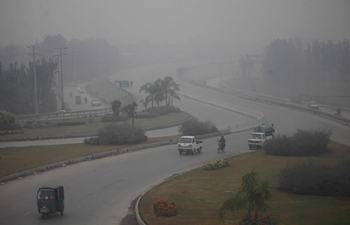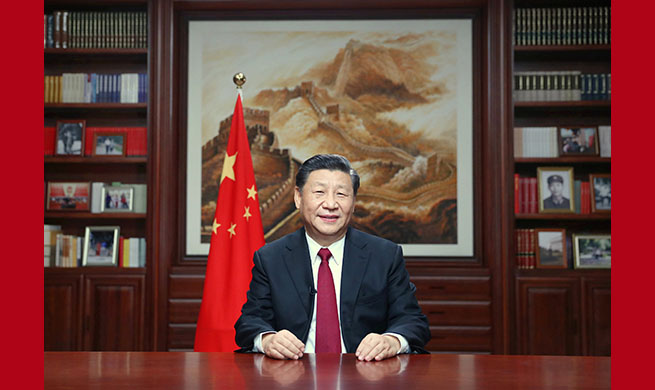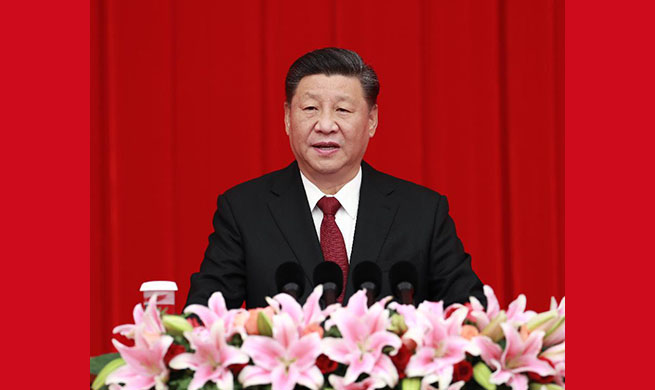by Keren Setton
JERUSALEM, Jan. 1 (Xinhua) -- Israel reached a major milestone on Tuesday, as natural gas from an off-shore field began flowing into the country.
After years of work, several delays and hundreds of millions of dollars, the Leviathan pipes filled with gas and joined the smaller Tamar field which began streaming to Israel in 2013. Leviathan, holding about 535 billion cubic meters of gas, is almost twice as big as Tamar.
The gas gives us diplomatic, economic and energy strength and it is very great news for the Israeli economy, said Israeli Prime Minister Benjamin Netanyahu as he stood on the command bridge of the Leviathan platform on Tuesday.
Israel now possesses more gas than it needs. In 2021, two more gas fields in Israeli waters are expected to operate.
Israel's natural gas project, which began early this century, has not been without controversy or concern. There has been criticism that the government was too generous with the big companies who funded the explorations. Accusations of a monopoly given to one big company were heard.
Environmentalists also voiced concerns over water toxicity in the vicinity of the gas pipes and air pollution in residential areas nearby. Demonstrations were held against the gas framework which many people believed was unjust and dangerous.
But the government stuck to its plans, and it also achieved complete gas independence.
Although it happened decades ago, the 1970s Arab oil embargo is a fresh memory in the minds of many Israelis. The effect was global and immediate. Targeting countries who were perceived supportive of Israel, the boycott exposed Israel to the political implications of its energy dependency.
A year ago, Israel joined the Eastern Mediterranean Gas Forum together with Egypt, Cyprus, Greece, the Palestinian Authority, Jordan and Italy. Based in Cairo, the forum would have not been possible years ago.
On Thursday, Israel is expected to sign an agreement with Cyprus and Greece for the building of the Eastern Mediterranean natural gas pipeline. The plan is natural gas from Israel being exported to Cyprus, Greece and eventually Italy through a 2,000-km pipeline.
"This is very ambitious, but it is possible in terms of engineering and is financially sound," said Amir Foster, executive director at the Israeli Association of Oil and Gas Exploration Industries.
It is estimated that 10 percent of Europe's gas needs will be met by this pipe, reducing tendency on Russia.
Also important to note is the dramatically reduced price of natural gas globally in recent years, making it a less lucrative product for export as it was in the past.
The Nobel Energy company which operates Leviathan has already signed export deals with the Jordanian National Electric Power Comp and the Egyptian East Gas company. Such agreements provide another facet of cooperation between the countries, making it difficult to sever ties in times of disagreement.
Now, Israeli media reported gas has already been transported to Jordan and Egypt is expected to receive gas in the coming days.
"Agreements on energy between corporations in the region tend to be very stable because they serve both economic and energetic interests," Foster told Xinhua, adding that "these interests serve to tone-down moments of crisis."
The importance of the Egyptian market cannot be underrated. Egypt's elevated status in the Arab world provides Israel with opportunities that were not present before. The energy relation is not without risk though -- in 2012, a pipeline between the two countries was blown up, with both sides hoping this will not recur.
For Israelis, the main immediate benefit will be a reduction of electricity prices. Currently, most of Israel's natural gas goes to the Israeli Electric Corporation (IEC). The rest goes to several private power plants and factories.
Another benefit will be the complete cessation of the usage of coal to produce electricity. Israel has been gradually decreasing the use of the pollutant and is expected to complete the move by 2030.

















